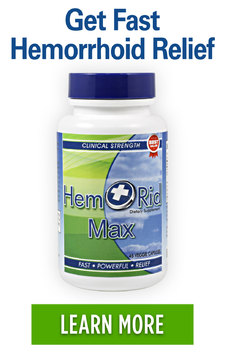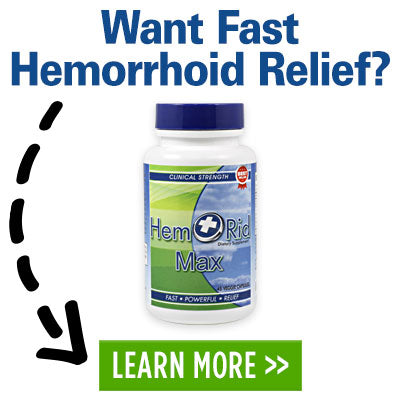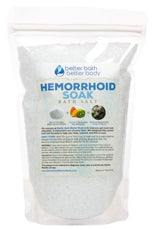How to Tell if You Have Hemorrhoids - Do You Have Hemorrhoids?
Posted on 09 March 2018 by Maryanne Johnson
Share this post
Do you want to know how to tell if you have hemorrhoids? In this guide we will let you know how to tell if you have hemorrhoids and also what type of hemorrhoid you have.
In addition, we will let you know the best treatment options for hemorrhoids. Hemorrhoids are considered to be extremely common, with approximately three of four adult people experiencing them occasionally during their lifetime.
If a person thinks they may have hemorrhoids which are bothering them, they more than likely should seek treatment because hemorrhoids don’t typically go away without treatment.
Who Gets Hemorrhoids the Most?
Well, hemorrhoids tend not to be race, gender or age-specific. Although they can happen in both men and women, they are more common in the adult of age 45 to 65.
Although women frequently develop hemorrhoids during pregnancy, there is actually no studies which determine women to get hemorrhoids more often than men. Men tend to seek treatment for this condition more often than woman though.
If you want a safe, herbal solution for your hemorrhoids, you might want to consider HemRid. This is a great supplement for hemorrhoids. If you are struggling with hemorrhoid pain and want relief, click on the image below to learn more.
Although the exact cause of hemorrhoids is not known, possible factors such as if a person has a family history of hemorrhoids, straining during a bowel movement,
complications from chronic constipation, and sitting for long periods of time can lead to a person being more prone to developing them.
Check out this youtube video...it show how to find out if you have hemorrhoids or not.
A person’s diet and constipation is considered to be common causes of a person’s developing hemorrhoids. Other risk factors could include obesity, pregnancy, childbirth, constant straining, standing too much with no break, constant anal sexual intercourse, diarrhea, and heavy lifting.
Do I Have Hemorrhoids You Ask?
Hemorrhoids can be internal or external, with the external being more noticeable. If the hemorrhoids are internal, they are inside the rectum, not being visible.
When a person has internal hemorrhoids, they typically cause little discomfort.
If you have external hemorrhoids and have to strain, these hemorrhoids can surface and bleed.
If your hemorrhoids are internal and straining pushes them through the anus, they most often cause pain and bleeding.
Hemorrhoid bleeding is very commonly associated with internal hemorrhoids.
When this occurs, then it is often referred to as prolapse or protruding hemorrhoids.
If a person’s hemorrhoids are external, they are located around the anus, under the skin. With external hemorrhoids, there is usually itching and/or bleeding.
This is a guide on how to stop hemorrhoid itching and burning.
Occasionally a hemorrhoid can thrombus. What this means is that blood can pool in the external hemorrhoid and actually form a clot.
This clot is referred to as a thrombus. When this happens, the patient will experience swelling, inflammation, severe pain, and a hard lump that is located near the anus.
A rubber band ligation procedure can be a great way to treat a thrombosed hemorrhoid.
Some patients never have symptoms with hemorrhoids, but unfortunately, many do.
Some of the more common signs and symptoms would include itching and pain in the anal region.
Some of the other signs and symptoms could include swelling around the anus, a lump near the anus, irritation in the area of the anal region, and painless bleeding when having a bowel movement.
The signs and symptoms that the patient may experience would be associated with the location in which they are located.
When Should a Person Go to Their Physician if They Have Hemorrhoids?
Well, this typically depends on the patient. The first thing would be where is their hemorrhoids located and what symptoms are they having.
If the person has internal hemorrhoids, then they may not even realize it and may never seek treatment for them.
If the hemorrhoids are external, it will be according to the severity of the symptoms if the person chooses to seek treatment. Some people have few symptoms, while others have moderate to severe hemorrhoid symptoms.
The most common sign of having hemorrhoids is bleeding during bowel movements. A person should never just assume that rectal bleeding is related to hemorrhoids. There are other more severe causes of rectal bleeding including cancer.
If rectal bleeding is frequent or in excess and they are having pain, then they should talk with a physician.
The physician will do a physical examination and possible other testing to help confirm that the diagnosis is hemorrhoids. They can also help to rule-out other serious diseases.

In some cases hemorrhoid surgery may be required, depending on the severity of the hemorrhoids.
Rectal bleeding can be a symptom of colitis, Crohn’s disease, diverticulitis, colorectal cancer, and colon polyps among other things. So it is important that hemorrhoids be diagnosed or ruled out.
If surgery isn't required, taking a hemorrhoid supplement like HemRid Plus can help fight the hemorrhoid pain.
Also, choosing the best OTC hemorrhoid medicine can help you get relief from hemorrhoids.
Is It Hemorrhoids or Fissure?
Another condition that could also cause pain and bleeding would be considered anal fissures. If one of these is diagnosed, then treatment would be needed.
When preparing to go to your hemorrhoid doctor or physician regarding potential hemorrhoids, always check with the physicians office to see if there is anything you need to do in advance.
Always write down any symptoms that you have been experiencing and any questions that you might have.
It is suggested that you take a list of all medications including over-the-counter medications and any key personal information with you to your appointment.
Prior to your appointment, you should eat a more high-fiber diet with foods such as vegetables, whole grains, and fruits.
Taking stool softeners, along with Metamucil or Citrucel can help to avoid constipation which can aggravate hemorrhoids.
Always drink six to eight glasses of water per day. This will also help to soften the stool and potentially help to relieve any symptoms.
Here is more information on hemorrhoid relief.
Do You Have Hemorrhoids?
If you have any of the symptoms that have been described, then you may have hemorrhoids. If so don’t ignore these symptoms, especially if you are experiencing occasional or frequent rectal bleeding.
You might want to try the product below. It has helped many hemorrhoid sufferers all over the world. It's made in the USA and is composed of outstanding herbal ingredients for hemorrhoidal relief.
Talk with a physician and have them diagnosed or rule out other serious conditions which these symptoms could potentially be indicative of. Your health is very important, be wise and take care of yourself.












0 comments